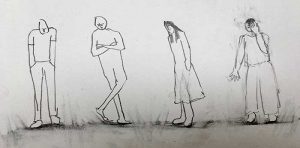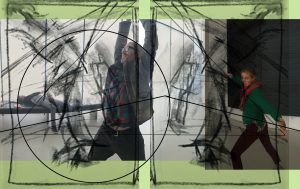Sexual Energy – too much, too little or just right?
In Open Floor we work with what we call the four ‘Relational Hungers’: Solitude, Connection, Belonging and Spirit, with the basis that “Everything is Relationship”. Even if we’re ignoring these relationships, they affect us and motivate us and underpin much of our heart’s desires, outlook on life and capacity for intimacy. One of the energies of those relationships is sexual energy and in the Libido Fundamentals workshop we put sexual energy in focus.
Many people who practise conscious dance as a path of embodiment say they feel energized, have more fun and enjoy the feeling of belonging to a community. Yet most of us know those times in life when we’re feeling flat, when life can seem mundane, full of drudgery. Those times when our relationships leave us feeling dull, even when our sex lives are boring or just lack excitement. We might change partners, change our style of relating or change our sex style but what’s underlying that can nourish us at source?
“When this energy is blocked, hidden, abused, exploited, or denied, the potential to do and experience harm to self and others is real and destructive.
When this energy is acknowledged, supported, and expressed authentically, the potential for healing is immense and empowering.” openfloor.org
Libido Fundamentals is a workshop that has been developed over the last 30 years by Andrea Juhan. I have been training with her for many years, recently as an apprentice to her in an ongoing Libido group. I’m so happy to be able to offer this work, with the intention of supporting people to live a life full of creative juice, fiery zest and erotic awakening.
In a Libido Fundamentals workshop we have time and space to navigate the physical, emotional, mental, and spiritual terrain of sexuality. We learn to take responsibility for our own behaviour and to take responsibility when responding to other people’s behaviour. We explore, honour and celebrate sexual energy through dancing in order to take those skills and erotic intelligence out into our lives. When we play and take risks it can feel deeply moving, we can feel turned on in a way that might be sexual or it might just be that we feel more connected with the energetic source of life.
Taking small risks first
One woman who comes regularly to my Open Floor class said that some of the skills she had learnt on the dance floor had helped her when she was dating a man that she really liked. She said her historical habit was to shy away, particularly when she really liked someone, but through practising taking small risks on the dance floor and following her impulses she found that it was much easier then when she was in an situation off the dance floor to listen in to what she really wanted and act on it. Focusing on our sexuality in an embodied way does give us more confidence, not only in dating but in following any passion or heart’s calling.
On our dancefloor we encourage free dance that is about wild abandon, free expression and it doesn’t matter what it looks like. On the dance floor, the practice is to remain present in one’s own body and when in contact with others not to be seeking to please them or looking for a particular response from them.
Effects on others
However, sometimes our dances affect others. Sexuality on the dance floor has its own issues: sometimes I hear from women who receive unwanted attention from men or attention that they don’t know how to deal with. I’m sure it happens the other way around too. My hope is that we can enhance awareness and empowerment on both sides.
Practical Information
Who: Libido programs are open to all adults regardless of gender identity, gender expression, biological sex, sexual orientation, or relationship status. We strive to co-create an environment that is inclusive, curious, expansive, and honours the experiences each person brings into the room.
What: Participants can expect to spend each day engaging in mindful movement practice, group sharing and inquiry along with some informative education. Nudity and actual genital contact are not part of this workshop.
When: November 16th–18th
Times: Friday 7pm–10pm, Saturday, 10am–6pm, Sunday 10am–4pm
Cost: £215 / Concession £185. 10% discount if paid in full by 5th October.
Where: Emerson College, East Sussex RH18 5JX. There is accommodation and full board at the venue, please enquire for availability and cost: earthbeam@gmail.com
Prerequisites: Some prior experience of Open Floor or other Conscious Dance practice is required. You will need at least 12 hours experience in a taught class.


